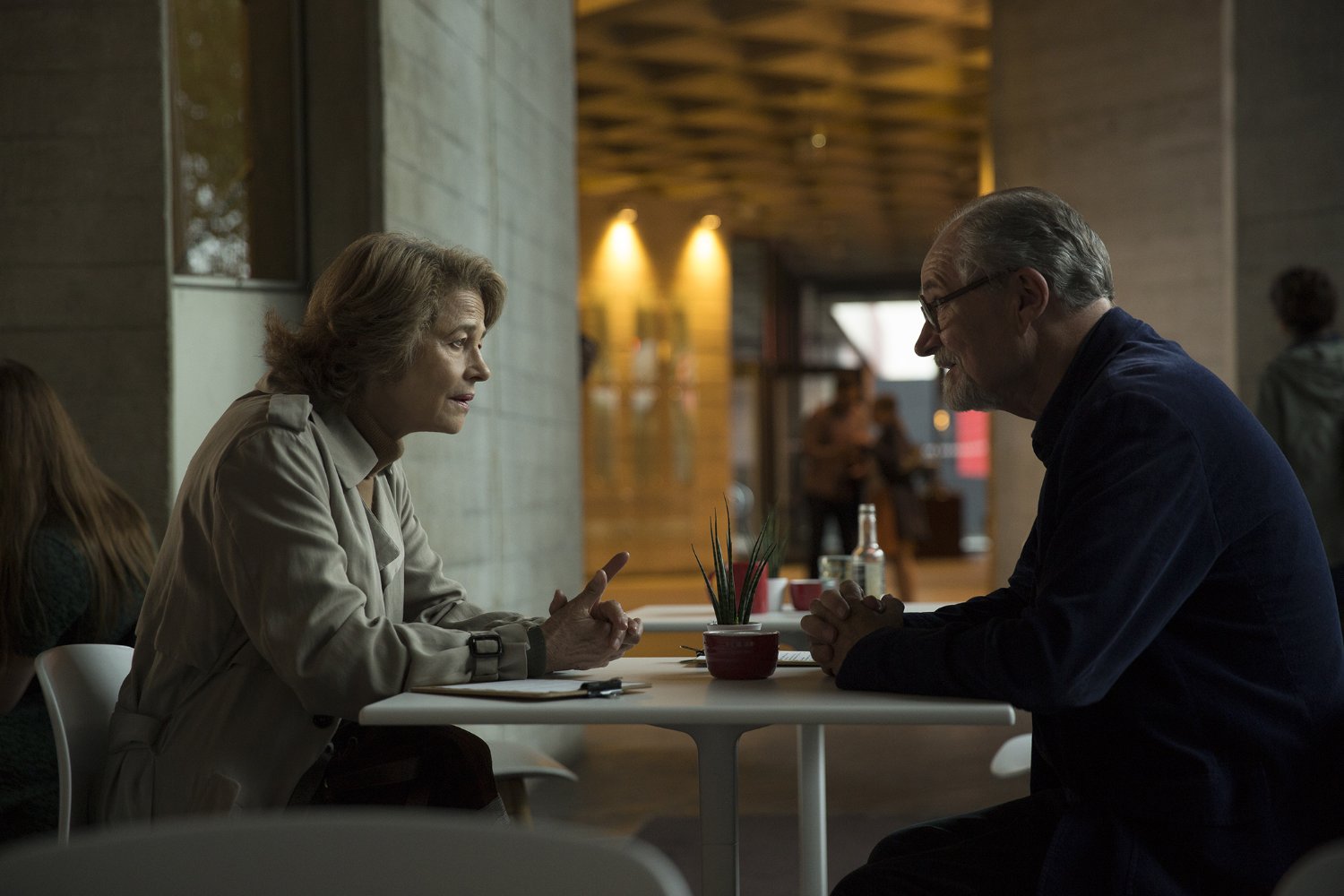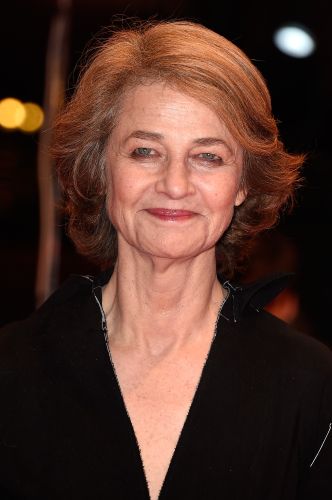Table Of Content

The character of the hard-bitten been-there-seen-that war reporter is a bit of a movie cliche. But Rampling is wonderful, adding layers to rude, arrogant Ruth, showing her affinity with those who are suffering. Ferrier is very good, too, as Sam, all unprocessed grief and defiance.

Charlotte Rampling films
Her Anne Boleyn in "The Six Wives of Henry VIII" (1972) also trod a delicate line between seductiveness and sadness as she attempted to bend the will of Henry (Keith Michell) to hers before meeting her fabled end. The film was condemned and celebrated with equal fervor during its release, but all parties agreed that Rampling's performance, which featured her in feverish scenes of morbid fetishism, was the film's highlight. The picture did much to cement Rampling as the thinking man's sex symbol, as did a 1973 layout for Playboy shot by Helmut Newton and a widespread rumor that she lived in a ménage-a-trois with her then-husband, publicist Bryan Southcombe, and male model Randall Laurence.
Night Train to Lisbon
The resulting film has earned Rampling some of the strongest reviews of her long and illustrious career—or at least the latest chapter of it. During this period, Rampling also suffered from depression, which led to a nervous breakdown in the early 1990s. Therapy helped her emerge from this dark period and, quite possibly, made it possible to deal with the very public fallout from tabloid reports that revealed numerous infidelities committed by her second husband, composer Jean Michel Jarre. The worldwide success of "Dove" launched a revival of interest in Rampling, who soon resumed a steady and impressive schedule of quality projects. She was a ravishingly ruined Miss Havisham in the BBC's 1999 adaptation of "Great Expectations," then joined Alan Bates and Gerard Butler in Michael Cacoyannis' 1999 film version of Chekhov's "The Cherry Orchard."
Highest rated movies
My husband at the time, Jean-Michel Jarre, really wanted to do the music. I loved this book and I loved the character of Jessica. He was unable to do it, and the next one was the David Lynch one, which I was not in. [Laughs.] Denis Villeneuve, I’ve been admiring his work, he makes very big films but he has a European heart — he’s Canadian, but he has a great intimacy in the way he works. When he asked me to do that, it seemed to make sense.
At 17, she was spotted by a casting agent, and made her proper film debut (she was uncredited for a nightclub scene in A Hard Day’s Night) in the Boulting brothers’ comedy Rotten To The Core in 1965. A year later she struck gold with the 60s classic Georgy Girl, an upbeat comedy with a dark underbelly in which she played posh mean-girl Meredith. I remind Rampling of the trailer, which describes her as a “sexy little dish” and “a doll never out of trouble”.
She continued her late career resurgence with a celebrated turn in the miniseries "Restless" (BBC One 2012) and an award-winning role in "45 Years" (2015), culminating in an Oscar nomination. In 2019, it was accounced that she would co-star in Denis Villeneuve's remake of "Dune" (2020). That character, Gaby, offers a bit of a sketch outline for the more psychologically complex but no less irascible Ruth in Matthew J. Saville’s poignantly realized directorial debut “Juniper,” based on his own prickly grandmother’s final days. Rampling plays an alcoholic war photographer staring down terminal illness who, now confined to a wheelchair, a buzzer, and a never-empty pitcher of watered-down gin, hopes for one last great love affair. Meanwhile, she’s under the de facto care of her self-destructive grandson Sam (George Ferrier), whom she becomes unexpectedly close with. When Jodorowsky was preparing it, he was thinking about having me play the role of Jessica.
She looks out of the window, or off to the side, until she catches a thought, then turns those eyes to look at me. She speaks slowly and thoughtfully, and often pauses as she considers where she’s going with what she’s about to say. Did she discuss this with other people or just internally?
Juniper
Juniper movie review & film summary (2023) - Roger Ebert
Juniper movie review & film summary ( .
Posted: Fri, 24 Feb 2023 08:00:00 GMT [source]
This movie focuses on a dozen of the five hundred characters depicted in Bruegel's painting. The theme of Christ's suffering is set against religious persecution in Flanders in 1564. Two sisters find their already strained relationship challenged as a mysterious new planet threatens to collide with Earth.
She has just moved, she explains, to a new place in Paris, the city in which she has lived for decades, and nothing is where she expects it to be. “Yes, I really was pinging,” she says, with that imperious cut-glass accent. “Pinging is when you’re at the right place at the right time, and you know you can just make magic happen everywhere.” We don’t ping often in life, she says, but when we do, it’s wonderful. In that film, Rampling played one of her prickliest characters, a callous and ambivalent mother who prefers to blithely take a bath during her daughter’s (Kirsten Dunst) wedding reception rather than make small talk or give toasts with the guests downstairs. Tessa Charlotte Rampling OBE (born 5 February 1946) is an English actress, model and singer, known for her work in European arthouse films in English, French, and Italian. An icon of the Swinging Sixties, she began her career as a model and later became a fashion icon and muse.
Meanwhile, Rampling starred "Rio Sex Comedy" (2010) opposite Bill Pullman and Fisher Stevens, and joined an ensemble cast for the biblically-themed drama "The Mill and the Cross" (2011). From there, Rampling was the superior of a Secret Service agent (Sean Bean) determined to stop a suicide bombing in the taut British thriller "Cleanskin" (2012). She went on to earn critical praise and A SAG award nod for her turn as a mother whose daughter investigates her past as a World War II spy in the made-for-cable movie "Restless" (Sundance Channel, 2012), which was adapted from William Boyd's award-winning novel. Tessa Charlotte Rampling OBE (born 5 February 1946)[1] is an English actress.[2][3] An icon of the Swinging Sixties, she began her career as a model.[4] She was cast in the role of Meredith in the 1966 film Georgy Girl, which starred Lynn Redgrave.
Charlotte Rampling denounces 'public lynching' of Gerard Depardieu despite sex assault claims - Yahoo News Canada
Charlotte Rampling denounces 'public lynching' of Gerard Depardieu despite sex assault claims.
Posted: Tue, 26 Dec 2023 12:26:19 GMT [source]
In 1975, Rampling starred opposite Robert Mitchum in the post-noir detective thriller Farewell, My Lovely, and offered a passionate rendering of a violent heiress confined to a mental institution in the French/Italian/German collaboration La Chair de l'Orchidée. The actress' success continued to grow throughout the latter half of the 1970s, and in 1980, Rampling played a lead role alongside Woody Allen in Stardust Memories, the follow-up to the much-hailed Manhattan. Shortly afterward, Rampling could be seen as the deceitful Laura in director Sidney Lumet's courtroom drama The Verdict (1982) with Paul Newman. Rampling spent much of the mid-'80s filming in Europe; one of her most notable performances during that time was as the mysterious mistress of a murder victim in the French crime thriller On Ne Meurt Que Deux Fois, though she would return to America for Alan Parker's Angel Heart. The heavily praised voodoo-themed crime thriller featured Rampling as an ill-fated woman whose heart is irrevocably extracted from her body.
As she entered her sixties, Rampling's career was in full bloom, with steely supporting turns in "The Duchess" (2008) and "Never Let Me Go" (2010). The definition of class for many a moviegoer the world over, Rampling's formidable body of work made her one of the most respected actresses on two continents. I’ve always been more of a European actor than an American actor, it’s closer to who I feel that I am.
After this, her acting career blossomed in both English and French cinema. “Because there’ll be a contradiction that comes in.” She is, though, still busy, still working. She is about to go back to Budapest to film a small part in Denis Villeneuve’s take on Dune (“I’m Reverend Mother Mohiam, who initiates Timothee Chalamet”) and then a Danish TV series, about which she can tell me absolutely nothing, other than that it’s in four languages. “It’s a very different story, I mean really chilling.” It sounds very Charlotte Rampling. “You know, I need the thrill of difference,” she says. She arrived at Gare du Nord in time to catch her train from Paris to London, but when she got there, she realised she had left her passport at home.
She was born Tessa Charlotte Rampling on Feb. 5, 1946 in the village of Sturmer, in Essex county, England. Her father was Godfrey Rampling, a Royal Army officer and three-time gold medalist in the 400 meter and 4x400 meter relays in the 1932 and 1936 Summer Olympics, while her mother, Anne Isabelle Gurten, was a painter from France. Her childhood was spent in transit, moving throughout the U.K., France and Gibraltar with her father's reassignments. She was educated in part at the Jeanne d'Arc Academie Pour Jeunes Filles in Versailles, which she later described as a lonely experience due to the language barrier. Happiness was found in a cabaret act she enjoyed with her older sister, Sarah, who died by her own hand in Argentina in 1967 after the premature birth of her daughter.

No comments:
Post a Comment